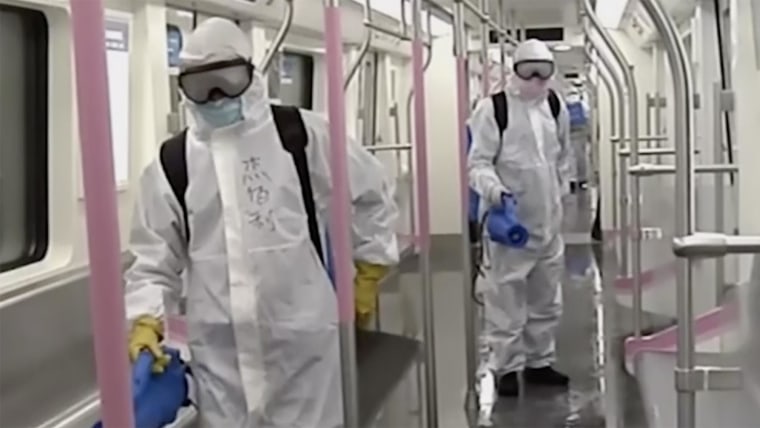Residents in the Chinese city of Wuhan, where the global coronavirus outbreak originated, have started to tentatively leave their homes for the first time in more than two months.
“We just feel extremely lucky today,” said Sainan Qian, 24, who visited the city’s famous cherry blossoms this week, after leaving her residential compound for the first time in 63 days. “Right now, everyone could use a bit of hope.”
In recent days, people have reported a loosening of restrictions in Wuhan, where the coronavirus first emerged in December.
Like many Chinese cities, Wuhan is organized into compounds, often consisting of a handful of apartment blocks, outside space and perhaps a food store. They are often walled off from the street and gated; a number of these compounds make up a district.
Some residents have been able to leave their compounds in the city, the capital of Hubei province, if they have a so-called “green code” that proves they are healthy and symptom-free.
Local authorities told them last week that if their district was determined to be free of the virus, they would be able to venture out into the surrounding area in phases, grouped by their buildings. If their district is “epidemic-free” for a week, convenience stores, pharmacies and vegetable markets could reopen, although inspections and risk assessments would be implemented.
Earlier this week, authorities in Hubei said workers would be able to go directly to work and back from midnight Wednesday, provided their companies had submitted an application and the workers had fulfilled the health certification, among other requirements.
Let our news meet your inbox. The news and stories that matters, delivered weekday mornings.
These restrictions will be lifted April 8 allowing broad-brush freedom of movement for Wuhan residents outside the city and the province for the first time in weeks.
“We’re entering a new phase in this quarantine, they’re trying to loosen restrictions and I’m assuming they’re going to see what happens,” said Doug Perez, 29, a teacher from California, who has lived in Wuhan for two years. “The best way to describe it is that it seems experimental.”
After the United States reported the highest number of coronavirus cases in the world earlier this week, authorities in China said Friday that there had been no new cases reported in Wuhan in the past 24 hours and only 55 new cases reported nationwide. Of those, 54 were so-called “imported” cases, brought into the country by foreigners, or returning Chinese nationals.
There were, however, four new deaths in Wuhan city, which has a population of 11 million.
Perez said on one recent exploration beyond the confines of his residential compound, he saw families walking, a fishmonger gutting fish at a local market and even light traffic beginning to build on the roads.
But there is a sense that these are the early days and it is unclear how fewer restrictions on daily life in this manufacturing center will play out. This has caused an initial hesitancy among many residents, with several saying they remained cautious about venturing outside.
Others said that despite their new freedoms, they had chosen to remain indoors. The people of Wuhan have learned that life is fragile, so venturing outside at this stage might not be worth the risk, according to them.
As a result people have not poured into the streets nor did locals report witnessing mass celebratory scenes.
Some, like Perez, were also concerned the virus could make a comeback.
“With everyone going back out, it seems reasonable there could be a second wave,” he said. “The date I’m most scared of is the official date April 8, I don’t want to be anywhere near the streets.”
Others balked at the bureaucratic hurdles they had to jump through in order to be able to roam around their districts.
“It’s just too complicated,” said Liu Fangjing, 22, a college student who is able to leave the confines of her community but who chose to stay home. “Besides, none of the restaurants or cinemas are open anyway.”
Saphora Smith and Matthew Mulligan reported from London; Leou Chen from Shenzhen and Eric Baculinao from Beijing.
Eric Baculinao contributed.













